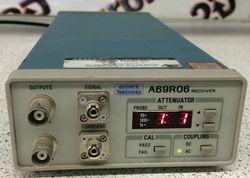A69R06: Difference between revisions
Jump to navigation
Jump to search
No edit summary |
No edit summary |
||
| (2 intermediate revisions by the same user not shown) | |||
| Line 1: | Line 1: | ||
The '''Tektronix A69R06''' is the receiver part of the [[A6906S]] fiberoptic voltage isolation system. | {{Instrument Sidebar | ||
|manufacturer=Sony/Tektronix | |||
|model=A69R06 | |||
|class=Isolator | |||
|series= | |||
|summary=fiberoptic voltage receiver | |||
|image=Tek a69r06 front.jpg | |||
|caption=Sony/Tektronix A69R06 | |||
|introduced=1993 | |||
|discontinued=(?) | |||
|designers= | |||
|manuals= | |||
* [[Media:070-8900-04.pdf|A6906S manual]] | |||
}} | |||
The '''Sony/Tektronix A69R06''' is the receiver part of the [[A6906S]] fiberoptic voltage isolation system. | |||
Together with the battery-powered [[A69T06]] transmitter, it can transfer analog signals over a pair of fiber cables up to 200 m length, with 100 MHz bandwidth. | Together with the battery-powered [[A69T06]] transmitter, it can transfer analog signals over a pair of fiber cables up to 200 m length, with 100 MHz bandwidth. | ||
The A6906S uses a fixed ×100 probe and gains of 5, 2 or 1, or attenuation of 1 to 50 in 1-2-5 sequence, for an overall attenuation of ×20 to ×5000. | |||
==Pictures== | ==Pictures== | ||
| Line 13: | Line 26: | ||
[[Category:Amplifiers]] | [[Category:Amplifiers]] | ||
[[Category:Optoelectronic instruments]] | [[Category:Optoelectronic instruments]] | ||
[[Category: | [[Category:GPIB interface]] | ||
Latest revision as of 05:43, 20 August 2021
The Sony/Tektronix A69R06 is the receiver part of the A6906S fiberoptic voltage isolation system. Together with the battery-powered A69T06 transmitter, it can transfer analog signals over a pair of fiber cables up to 200 m length, with 100 MHz bandwidth.
The A6906S uses a fixed ×100 probe and gains of 5, 2 or 1, or attenuation of 1 to 50 in 1-2-5 sequence, for an overall attenuation of ×20 to ×5000.


